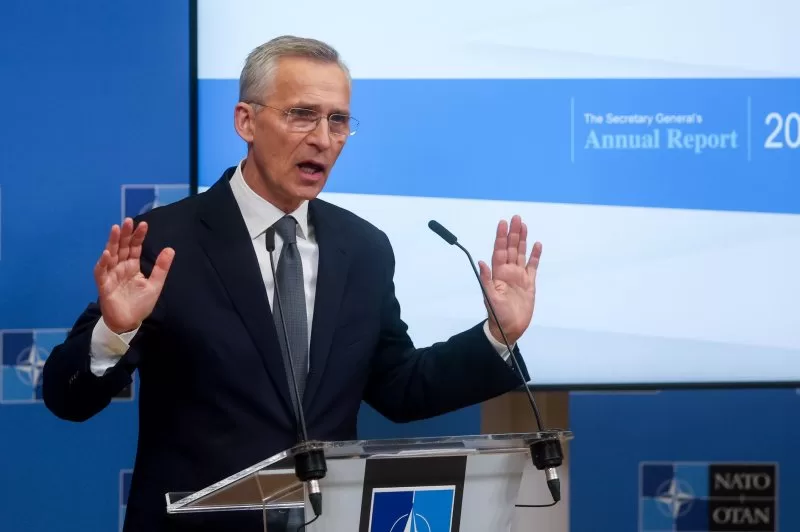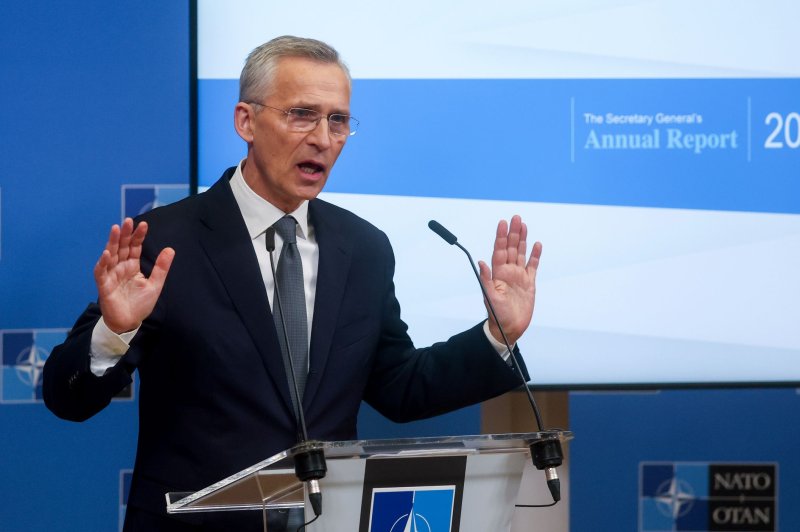NATO Secretary General Jens Stoltenberg used the launch of his annual “state of the alliance” review Thursday to call on members of the 32-country security pact to increase the flow of weapons and ammunition to Ukraine as matter of urgency. Photo by Olivier Hoslet/EPA-EFE
March 14 (UPI) — NATO Secretary General Jens Stoltenberg used his annual review of the “state of the alliance” to urge members of the newly-expanded 32-country military pact to increase the flow of weapons and ammunition to Ukraine.
Unprecedented aid from NATO Allies had helped Ukraine to survive as a sovereign, independent nation, he told a press conference in Brussels accompanying the release of his 2023 Annual Report, but that it “needed even more support and they need it now.”
“The Ukrainians are not running out of courage. They are running out of ammunition, ” said Stoltenberg.
“Together, we have the capacity to provide Ukraine what it needs. Now we need to show the political will to do so. All Allies need to dig deep and deliver quickly. Every day of delay has real consequences on the battlefield in Ukraine.”
Calling it a critical moment, Stoltenberg said it would be a “grave, historic mistake to allow Putin to prevail.”
“We cannot allow authoritarian leaders to get their way by using force. This would be dangerous for us all,” he said.
He called on the United States, as the biggest provider of weapons and ammunition to Ukraine, to resolve the logjam on Congress currently cutting off virtually all military aid, but stressed that all NATO members needed to step up.
“My message to the United States is that they are not alone, European Allies and Canada also providing significant support. But both U.S., Canada and Europe has to do more,” he said adding that a long-term commitment was also required to enable the Ukrainians to forward plan.
“This is a question of political will to take the decisions and to prioritize support for Ukraine. And therefore we need the decisions to invest more in defense industry. We need to ensure that our governments are inking contracts so they can make the commercial decisions to scale up production.
He stressed that NATO could only allocate support, ammunition and also other types of military equipment to Ukraine with the will of the allies.
Stoltenberg said Putin’s gambit to use military aggression to put a lid on NATO expansion had backfired, evidenced by Finland’s accession last year, Sweden’s last week and the fact the Ukraine-NATO relationship has been strengthened.
He noted NATO members Britain, France and Germany had also signed bilateral defense pacts with Ukraine.
Stoltenberg maintained that two-thirds of the public in NATO countries wanted their government to go on providing artillery and ammunition, long-range missiles, tanks and armored personnel carriers, patrol boats, air defenses, helicopters and drones and radar that make up 99% of all military aid to Ukraine.
On the state of the alliance, Stoltenberg said it had re-inforced its defenses, drawn up robust new military plans, placed more forces on a higher readiness footing and seen an 11% hike in defense investment to $470 billion, the ninth consecutive annual rise by Europe and Canada.
Defense spending would in 2024 for the first time, he said, reach the 2% of GDP target across alliance member-states agreed back in 2014, although he caveated the claim by admitting spending shortfalls by a third of countries were balanced out by above-target spending countries.
Stoltenberg said other notable achievements in 2023 were the Defense Production Action Plan, ramping up production, strengthening engagement with industry and boosting interoperability resulting in contracts worth tens of billions of dollars for ammunition and key capabilities.
He also highlighted the strengthening of ties with like-minded partners and friends in the Indo-Pacific and the European Union.

